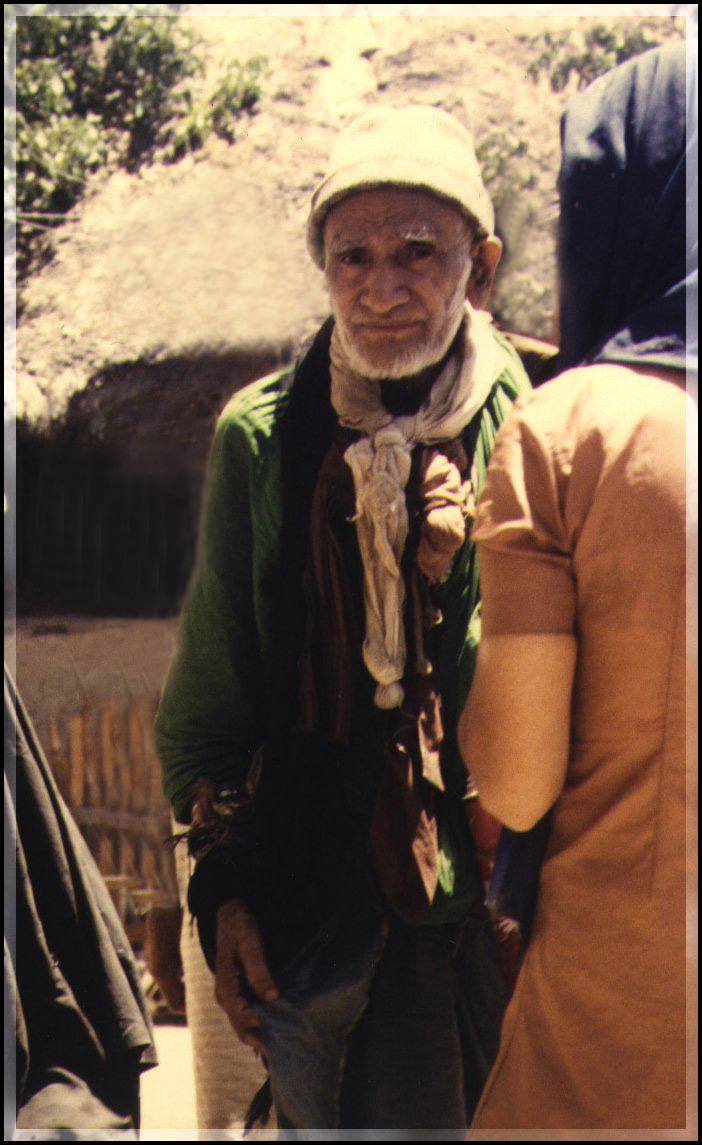|
بسم الله الرحمن الرحيم |
|
||
We arrived in the village that same evening. As we stepped out of the taxi, several people walked over to us. They told our driver that Baba was expecting us. Even though there were no telephones or telegraph offices near by Baba Sultan had told everyone that we were coming. He had no need of technology to keep track of things! There were many people mulling about inside and outside of his house. Baba was in the kitchen sitting on the dirt floor, eating rice. The powerful presence emanating from him permeated the room. Although the dervish was literarily surrounded by people, he looked inwardly engrossed and completely peaceful. Yet, at the same time he was obviously aware of everything that was going on around him. People were talking to Baba (sometimes more then one at a time) telling him their dilemmas. They sought help for physical ailments, financial difficulties, family issues, ailing farm animals, and even damaged crops. Sometimes Baba responded verbally, but after he uttered a few words his attention would return inward. Sheikh Sultan often appeared to be focused far beyond his physical surroundings. Baba spoke infrequently. When he did converse he used symbols, rarely addressing a problem with a direct or analytical solution. I was to find out that most people admitted that they didn't understand the meaning of his words. The language of symbols that Baba used was powerful, all encompassing. I later came to understand that a symbol has a specific meaning to a student at the time it is first mentioned. Then, as the student grows and develops the symbol remains with him/her, expanding, changing and unfolding into new meanings. As one's understanding grows and changes, so too does the meaning of each particular symbol. Thus, the language of symbols has a power all of its own. This form of communication has been used as a teaching tool down through the ages. The prophets used it in parables and prophesy; the holy books of all religions use it. It is the speech of the most holy and Baba Sultan had mastered its dialects. Even though most people admitted that they didn't understand the meaning of Baba's words, they came by the hundreds, telling him their woes and begging for his help. All who came were comforted in some way! As this particular night progressed some people left but many remained. The villagers told us that Baba Sultan was never alone. Even while he slept, he was surrounded by people who camped in, and around his house. Still, Baba’s deep sense of inner peace was evident; he was in reality, alone with God. As I stood within the throng of people looking at this unpretentious saintly man, I realized that I needed to devise some way to get closer to him. I wanted to speak with him directly; but how? There was no "orderly" way to take my turn, no lines; no place to make an appointment. I simply had to watch and wait until the perfect time presented itself. At last Baba rose and went into the other room. I followed him hastily trying to surmise where he was going to sit. I planted myself on the dirt floor hoping I had made an accurate choice. Baba looked around and then to my great relief, decided to sit just where I had hoped he would... a few inches from my chosen spot! Of course there weren't any chairs. This was a village house and everyone, including the Sheikh, sat on the dirt floor. Seconds after he sat down people surrounded him, leaving few if any gaps for those unlucky enough to be on the wrong side of the room. Then, as was the custom, those close began grabbing for his hand and crying out their pleas. Again, there was no apparent orderly way to make a request. I was overwhelmed by the number of people reaching for Baba’s hand. Yet, there I was amongst them, sitting as close to the Sheikh as I could get, waiting for the right time to take his hand and communicate my requests.
All photographs of Sheikh Baba Sultan, other photographs,
pictures/artwork, and original text are the property of: jgs/erg. They
are NOT to be used nor reproduced under any circumstances, without
written permission from owner. Copyright © 2000 - 2010 by Judi Sherman & Elieen Giltinan All Rights Reserved
Designed by:
Diana Daoud.
|
||||


